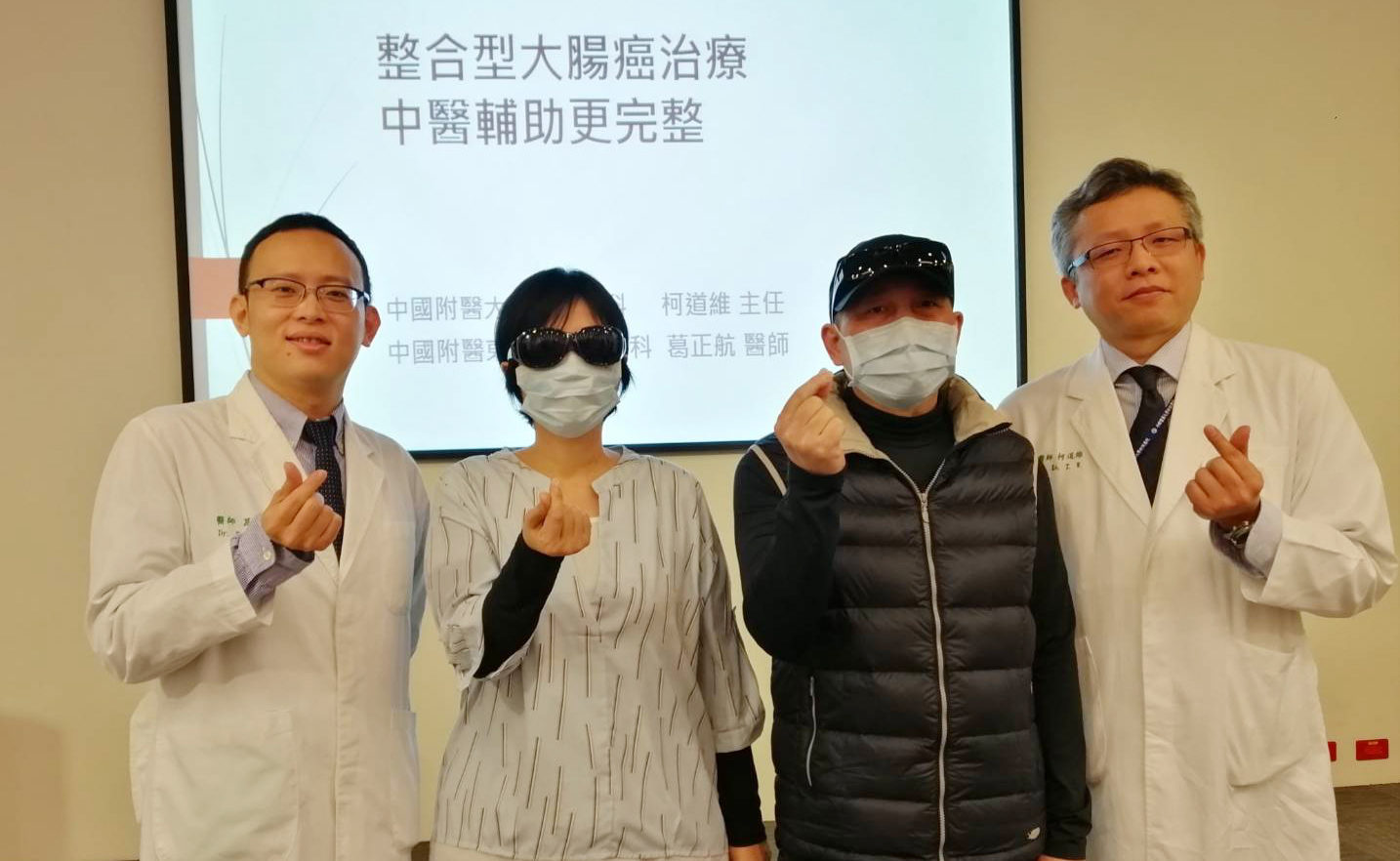News and Award
About CMUH
Integrated colon cancer treatment made better with auxiliary Chinese medicine

Cheng Hang Ko, Chinese Internal Medicine, Easter Branch Hospital, China Medical University Hospital
Tao Wei Ke, Director, Colorectal Surgery, China Medical University Hospital
In Taiwan, there are 15000 new colon cancer patients each year, 5800 of whom die of colon cancer, making it a disease that cannot be ignored. The treatment for colon cancer currently include surgery, radiation therapy, and chemotherapy. Different side effects appear with different treatment.
The Ministry of Health and Welfare has launched the‘Health Insurance for Cancer of Western Medicine Hospitalization with Auxiliary Chinese Medicine Project' and‘Health Insurance Chinese Medicine Cancer Clinical Care Project' in the hope of combining Chinese and western medicine to alleviate the discomfort often appearing in malignant tumor patients in order to complete the whole treatment process smoothly.
Combining Chinese and western medicine has been the mission of the China Medical University Hospital. Under Director Tao Wei Ke of Colorectal Surgery, there are more than 200 of Chinese medicine hospitalized colon cancer patients per year with around 250 Chinese medicine colon cancer patients per month, benefitting many colon cancer patients.
Director Tao Wei Ke of Colorectal Surgery is himself well versed in both western and Chinese medicine. Director Ke points out, “We hope to alleviate the side effects of colon cancer patients receiving treatment with Chinese medicine to enhance the life quality of the patients. China Medical University Hospital provides both Chinese and western medicine care. Communications between the departments are fluent and thus the treatment even more delicate.
Dr. Cheng Hang Ko of Chinese Internal Medicine indicates that there are many side effects to colon cancer treatment, such as fatigue and weakness, loss of appetite, nausea, vomit, abdominal distention, diarrhea, low white cell, numbness to the limbs, dry mouth, etc. If supplemented with Chinese medicine treatment, the discomfort will be greatly reduced making treatment much easier.
《Case 1》
56-year old Mr. Chen came to Colorectal Surgery clinic of China Medical University Hospital for change in bathroom habit, abdominal pain, and loss of appetite and was found to have colon cancer after checkup. The affected area of the tumor was bigger so he was arranged Neoadjuvant chemotherapy during which time, the patient became weak and had a loss of appetite. Director Ke and Dr. Ko came together during chemotherapy by combining Chinese medicine treatment. The appetite and spirit of the patient greatly improved and finished the chemotherapy smoothly.
《Case 2》
37-year old Miss Tsai came due to bloody stool and was diagnose as stage 3 colon cancer. Adjuvant chemotherapy was ordered after the surgery. In the pre-scheduled 12 therapy sessions, the patient wanted to give up after 3 sessions. After being referred to Dr. Ko’s clinic for supplemental Chinese treatment, sensation of vomit was greatly reduced and the entire therapy was completed.
Dr. Ko said that using the chemotherapy that many patients dread as example, chemotherapy is in the category of heat and poison in Chinese medicine because nausea and vomit, abdominal distention and diarrhea, dry mouth are often seen in patients in addition to weakness in the patient, resulting in the combination of weak with strong. Inner weakness expressed as strong on the outside is often the type exhibited in the body. In Chinese medicine, many herbs can be used. For the most common nausea and vomit, loss of appetited, abdominal distention and diarrhea, Saussures & Cardamon Combination (Xiang Sha Liu Jun Zi Tang) and Chinese thorowax liver vegetable soup can be used to increase appetite, reduce distention, stop vomiting. For fatigue and dizziness, Ginseng & Astragalus Combination (Bu Zhong Yi Qi Tan) and Major Four Herb Combination(Si Jun Zi Tang) can be used to increase vigor and blood circulation. When white cell count is lowered, Cyathula & Plantago Formula(Ji Sheng Shen Qi Wan) and Eucommia & Rehmannia Formula (You Gui Wan) can be used to repair the kidney, increase immunity. For numbness to the limbs, besides medication, acupuncture therapy is also a good choice.
Director Ke points out that colon cancer is a ‘complicated’ disease and not a ‘terminal’ disease. The process of fighting the cancer is like a hard tug of war. We want the more help for the cancer patient the better. The Cancer of Western Medicine Hospitalization with Auxiliary Chinese Medicine Project promoted by the Ministry of Health and Welfare has been realized in China Medical University Hospital. Combining the west with the east with multi-channel treatment, patients can smoothly complete the treatment, maintain quality of life, and overcome cancer.



![[Taiwan–Malaysia Medical Innovation Forum] CMUH and UNIMAS Co-Host Major Medical Symposium to Advance Medical Technology and Precision Patient Care img](/FileUploads/News/20250714_131324.jpg?w=250&h=180&mode=crop&scale=both)